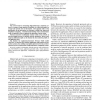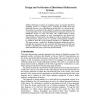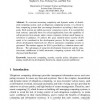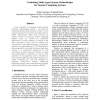124
click to vote
SRDS
2010
IEEE
14 years 12 months ago
2010
IEEE
With the growing scale of current computing systems, traditional configuration tuning methods become less effective because they usually assume a small number of parameters in the...
144
click to vote
IEEEHPCS
2010
15 years 2 hour ago
2010
In grid computing systems, providing fault-tolerance is required for both scientific computation and file-sharing to increase their reliability. In previous works, several mechani...
138
click to vote
TJS
2002
15 years 1 months ago
2002
Abstract-The current trend in constructing high-performance computing systems is to connect a large number of machines via a fast interconnect or a large-scale network such as the ...
119
click to vote
CLUSTER
2004
IEEE
15 years 1 months ago
2004
IEEE
Grid computing systems are emerging as a computing infrastructure that will enable the use of wide-area network computing systems for a variety of challenging applications. One of ...
120
Voted
FMOODS
2003
15 years 3 months ago
2003
Performance analysis of computing systems, in particular distributed computing systems, is a complex process. Analysing the complex flows and interactions between a set of distribu...
136
click to vote
AICCSA
2005
IEEE
15 years 4 months ago
2005
IEEE
Autonomic Computing was introduced to reduce the complexity of managing computing systems; however, the heterogeneous nature existing in most computing systems introduces some dif...
148
click to vote
ATC
2006
Springer
15 years 5 months ago
2006
Springer
Abstract. To overcome increasing complexity and dynamic nature of distributed computing system, such as ubiquitous computing systems, it is critical to have computing systems that ...
129
click to vote
HPDC
1998
IEEE
15 years 6 months ago
1998
IEEE
The potential for faults in distributed computing systems is a significant complicating factor for application developers. While a variety of techniques exist for detecting and co...
120
click to vote
ESOP
2005
Springer
15 years 7 months ago
2005
Springer
Are computing systems trustworthy? To answer this, we need to know three things: what the systems are supposed to do, what they are not supposed to do, and what they actually do. A...
142
click to vote
DEXAW
2005
IEEE
15 years 7 months ago
2005
IEEE
As the complexity of computing systems steadily increases, self-managing systems – as Autonomic Computing Systems (ACS) proposed by IBM – are an adequate approach to minimize ...




